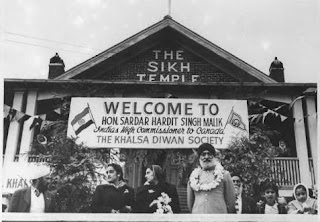Hardit Singh Malik, The Original 'Flying Sikh' Who Was A Fighter Pilot In World War I
Indiatimes15 May. 2016
Almost 1.3 million Indians fought in World War I, but there was one who flew an aircraft and sadly, we don’t know anything about him. Sardar Hardit Singh Malik, was the first Indian, or rather Asian to join the Royal Flying Corps and participate in aerial combat on the western front during which he battled and shot down German fighters. Indiatimes15 May. 2016
Malik was born on 23 November, 1892 in a Sikh family from Rawalpindi, Punjab which was a part of pre-partitioned India. Hardit Singh went to England at age 14, did his schooling from English Public School, Eastborne College, from where he went to Balliol College at Oxford. After graduating with honours, his co-curricular achievements were applauded as he was good in both cricket and golf.

\During World War I in 1914, he was in his second year at Oxford and most of his British colleagues volunteered to join the fighting services. Sardar Hardit Singh Malik too wanted to join. He was initially denied permission to join the force and was instead asked to serve as an orderly in an Indian military hospital. But he overcame institutional racism to become a fighter pilot for the British before he took on the Germans.
When he was initially denied permission, a dejected Malik then went to France to help out as an ambulance driver and asked the authorities if he could volunteer in the air force. Thankfully, the French agreed. Malik wrote a letter to his tutor at Oxford giving him the good news. The tutor then took it up with the chief of the RFC and said it would be an embarrassment if a British subject was employed by the French. After a long struggle, Malik was finally sent for training and was commissioned in the RFC, becoming the first Indian fighter pilot. RFC would go on to become the Royal Air Force during the war and it was Hardit Singh's commissioning that led RFC to open its doors for Indians.
In those days he was the first to be posted to the new squadron and was fondly known as a Sikh from Rawalpindi. Malik never parted ways with his turban, and somehow managed to fit over it, an outsized flying helmet, earning the nickname of ‘Flying Hobgoblin’ from the ground crews. Unfortunately he was credited with only two kills.
But that’s not all there is to his story.
Later, Malik served as Joint Secretary to the Government of India from 1934 to 1937 and as India's Trade Commissioner to the United States and Canada, based in New York, from 1938 to 1943. Additionally, he was also the Premier of the state of Patiala from 1943 to 1947.
In 1949, he became the Indian ambassador to France after which he retired in 1956.
After retirement, he returned to his first love, golf, even with two German bullets still embedded in his leg. Sardar Hardit Singh lived till he was 91, passing away on 31 October 1985.


No comments:
Post a Comment